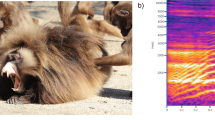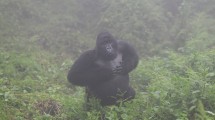Abstract
Loud auditory gestures that are produced by repetitively percussing body parts are rare in primate repertoires and have been mostly observed in captive settings. Gorillas produce two of the most conspicuous long-range signals of this type: chest beating and hand clapping. Here we present the first systematic analysis of chest beating (n = 63) and hand clapping (n = 88) in wild western gorillas to assess the behavioral contexts in which they emerged, the flexibility of their use, and the age–sex classes that produced them. Data were collected at the Mondika Research Center, Republic of Congo, from a habituated gorilla group during two separate collection periods (June–August 2007; May 2009–June 2010). Our results show that both signals are highly context specific, with chest beating used only during display and/or play and hand clapping used only during vigilance and/or play. Age–sex classes differed in their use and production of these signals in that immature individuals used both signals only when playing, the male only used chest beating when displaying and never hand clapped, and adult females used both signals flexibly in two contexts instead of one. This study confirms previous anecdotal accounts of loud auditory gestures in western gorillas and adds crucial information on their flexibility across age categories. While chest beating has been described in both gorilla species, hand clapping as a way to communicate potential danger is unique to western gorillas. Further studies should focus on determining the variations in frequency and use across geographically distant populations.

Similar content being viewed by others
References
Altmann J (1974) Observational study of behavior—sampling methods. Behaviour 49:227–267. https://doi.org/10.1163/156853974X00534
Arcadi AC, Robert D, Boesch C (1998) Buttress drumming by wild chimpanzees: temporal patterning, phrase integration into loud calls, and preliminary evidence for individual distinctiveness. Primates 39:505–518
Babiszewska M, Schel AM, Wilke C, Slocombe KE (2015) Social, contextual, and individual factors affecting the occurrence and acoustic structure of drumming bouts in wild chimpanzees (Pan troglodytes). Am J Phys Anthropol 156:125–134. https://doi.org/10.1002/ajpa.22634
Boesch C (1991) Symbolic communication in wild chimpanzees? Hum Evolution 6:81–89. https://doi.org/10.1007/BF02435610
Boesch C (1996) The emergence of cultures among wild chimpanzees. Proc Br Acad 88:251–268
Byrne RW, Cartmill E, Genty E, Graham KE, Hobaiter C, Tanner J (2017) Great ape gestures: intentional communication with a rich set of innate signals. Anim Cogn. https://doi.org/10.1007/s10071-017-1127-1
Cartmill EA, Byrne RW (2007) Orangutans modify their gestural signaling according to their audience’s comprehension. Curr Biol 17:1345–1348. https://doi.org/10.1016/j.cub.2007.06.069
Cooper J, Hull G (2017) Gorilla pathology and health. Academic Press, London, UK
Crockford C, Boesch C (2003) Context-specific calls in wild chimpanzees, Pan troglodytes verus: analysis of barks. Anim Behav 66:115–125
De Waal FBM (1988) The communicative repertoire of captive bonobos (Pan paniscus), compared to that of chimpanzees. Behaviour 106:183–251. https://doi.org/10.1163/156853988x00269
Delgado RA (2006) Sexual selection in the loud calls of male primates: signal content and function. Int J Primatol 27:5–25
Doran-Sheehy DM, Greer D, Mongo P, Schwindt D (2004) Impact of ecological and social factors on ranging in western gorillas. Am J Primatol 64:207–222
Dufour V, Poulin N, Charlotte C, Sterck EHM (2015) Chimpanzee drumming: a spontaneous performance with characteristics of human musical drumming. Sci Rep 5:11320. https://doi.org/10.1038/srep11320
Fay JM (1989) Hand-clapping in western lowland gorillas. Mammalia:457-458
Fischer J (1998) Barbary macaques categorize shrill barks into two call types. Anim Behav 55:799–807
Fletcher AW (2006) Clapping in chimpanzees: evidence of exclusive hand preference in a spontaneous, bimanual gesture. Am J Primatol 68:1081–1088. https://doi.org/10.1002/ajp.20308
Fossey D (1972) Vocalizations of mountain gorilla (Gorilla gorilla beringei). Anim Behav 20:36–53
Fossey D (1983) Gorillas in the mist. Houghton Mifflin, Boston, Mass
Freeman GH, Halton JH (1951) Note on exact treatment of contingency, goodness of fit and other problems of significance. Biometrica 38:141–149
Frohlich M, van Schaik CP (2018) The function of primate multimodal communication. Anim Cogn 21:619–629. https://doi.org/10.1007/s10071-018-1197-8
Fröhlich M, Wittig RM, Pika S (2016) Play-solicitation gestures in chimpanzees in the wild: flexible adjustment to social circumstances and individual matrices. R Soc Open Sci 3:160278. https://doi.org/10.1098/rsos
Genty E, Byrne RW (2010) Why do gorillas make sequences of gestures? Anim Cogn 13:287–301. https://doi.org/10.1007/s10071-009-0266-4
Genty E, Breuer T, Hobaiter C, Byrne RW (2009) Gestural communication of the gorilla (Gorilla gorilla): repertoire, intentionality and possible origins. Anim Cognit 12:527–546. https://doi.org/10.1007/s10071-009-0213-4
Goodall J (1986) The chimpanzees of Gombe: patterns of behavior. Harvard University Press, Cambridge
Gott T, Weir K (2013) Gorilla. Reaktion, London
Graham KE, Hobaiter C, Ounsley J, Furuichi T, Byrne RW (2018) Bonobo and chimpanzee gestures overlap extensively in meaning. PLoS Biol 16:e2004825. https://doi.org/10.1371/journal.pbio.2004825
Herbinger I, Papworth S, Boesch C, Zuberbühler K (2009) Vocal, gestural and locomotor responses of wild chimpanzees to familiar and unfamiliar intruders: a playback study. Anim Behav 78:1389–1396. https://doi.org/10.1016/j.anbehav.2009.09.010
Hobaiter C, Byrne RW (2011) The gestural repertoire of the wild chimpanzee. Anim Cogni 14(5):745–767. https://doi.org/10.1007/s10071-011-0409-2
Hostetter AB, Cantero M, Hopkins WD (2001) Differential use of vocal and gestural communication by chimpanzees (Pan troglodytes) in response to the attentional status of a human (Homo sapiens). J Comparative Psychol 115:337–343. https://doi.org/10.1037//0735-7036.115.4.337
Ingmanson EJ (1989) Branch dragging by pygmy chimpnazees at Wamba, Zaire—the use of objects to facilitate social communication in the wild. Am J Phys Anthropol 78:244
Kalan AK, Rainey HJ (2009) Hand-clapping as a communicative gesture by wild female swamp gorillas. Primates 50:273–275. https://doi.org/10.1007/s10329-009-0130-9
Kitchen DM (2004) Alpha male black howler monkey responses to loud calls: effect of numeric odds, male companion behaviour and reproductive investment. Anim Behav 67:125–139. https://doi.org/10.1016/j.anbehav.2003.03.007
Koops K, Matsuzawa T (2006) Hand clapping by a chimpnazee in the Nimba Mountains. Pan Africa News 13:19–21
Leavens DA, Russell JL, Hopkins WD (2010) Multimodal communication by captive chimpanzees (Pan troglodytes). Anim Cogn 13(1):33–40. https://doi.org/10.1007/s10071-009-0242-z
Lewis KP (2000) A comparative study of primate play behaviour: implications for the study of cognition. Folia Primatol 71:417–421. https://doi.org/10.1159/000052740
Liebal K, Call J (2012) The origins of non-human primates' manual gestures. Philos Trans Roy Soc B Biol Sci 367(1585):118–128
Liebal K, Call J, Tomasello M (2004) Use of gesture sequences in chimpanzees. Am J Primatol 64:377–396. https://doi.org/10.1002/ajp.20087
Lyn H, Russell JL, Leavens DA, Bard KA, Boysen ST, Schaeffer JA, Hopkins WD (2014) Apes communicate about absent and displaced objects: methodology matters. Anim Cogn 17:85–94. https://doi.org/10.1007/s10071-013-0640-0
Maestripieri D (1997) Gestural communication in macaques. Evol Commun 1:193–222
Marler P (1976) Social organization, communication and graded signals: the chimpanzee and the gorilla. In: Bateson PPG, Hinde RA (eds) Growing points in ethology. Cambridge University Press, Cambridge, pp 239–280
Miles HL, Mitchell RW, Harper SE (1996) Simon says: the development of imitation in an enculturated orangutan. In: Russon AE, Bard KA, Parker ST (eds) Reaching into thought. Cambridge University Press, Cambridge, pp 278–299
Nadler RD (1989) Sexual initiation in wild mountain gorillas. Int J Primatol 10(2):81–92. https://doi.org/10.1007/bf02736246
Ordonez-Gomez JD, Santillan-Doherty AM, Fischer J, Hammerschmidt K (2018) Acoustic variation of spider monkeys’ contact calls (whinnies) is related to distance between vocalizing individuals and immediate caller behavior. Am J Primatol 80:e22747. https://doi.org/10.1002/ajp.22747
Palombit RA (1992) A preliminary study of vocal communication in wild long-tailed macaques (Macaca fascicularis). II. Potential of calls to regulate intragroup spacing. Int J Primatol 13:183–207
Parker ST, Mitchell RW, Miles HL (1999) The mentalities of gorillas and orangutans: comparative perspectives. Cambridge University Press, New York
Pika S (2008) What is the nature of the gestural communication of great apes. In: Zlatev J, Racine T, Sinha C, Itkonen E (eds) The shared mind. Perspectives on intersubjectivity. Johns Benjamins, Amsterdam, pp 165–186
Pika S, Liebal K, Tomasello M (2003) Gestural communication in young gorillas (Gorilla gorilla): gestural repertoire, learning, and use. Am J Primatol 60:95–111. https://doi.org/10.1002/ajp.10097
Pika S, Liebal K, Tomasello M (2005) Gestural communication in subadult bonobos (Pan paniscus): repertoire and use. Am J Primatol 65:39–61. https://doi.org/10.1002/ajp.20096
Pollick AS, de Waal FBM (2007) Ape gestures and language evolution. Proc Natl Acad Sci USA 104:8184–8189. https://doi.org/10.1073/pnas.0702624104
Pullen PK (2005) Preliminary comparisons of male/male interactions within bachelor and breeding groups of western lowland gorillas (Gorilla gorilla gorilla). Appl Anim Behav Sci 90:143–153. https://doi.org/10.1016/j.applanim.2004.08.016
Redshaw M, Locke K (1976) The development of play and social behaviour in two lowland gorilla infants. J Jersey Wildl Preserv Trust Ann Rep 13:71–86
Remedios R, Logothetis NK, Kayser C (2009) Monkey drumming reveals common networks for perceiving vocal and nonvocal communication sounds. Proc Natl Acad Sci USA 106:18010–18015. https://doi.org/10.1073/pnas.0909756106
Reynolds V, Reynolds F (1965) Chimpanzees of the Budongo Forest. In: DeVore I (ed) Primate behavior. Field studies of monkeys and apes. Holt, Rinehart and Winston, New York, pp 425–473
Robbins MM et al (2016) Behavioral variation in gorillas: evidence of potential cultural traits. PLoS One 11:18. https://doi.org/10.1371/journal.pone.0160483
Roberts AI, Roberts SGB (2016) Wild chimpanzees modify modality of gestures according to the strength of social bonds and personal network size. Sci Rep 6. https://doi.org/10.1038/srep33864
Roberts AI, Roberts SGB, Vick S-J (2014) The repertoire and intentionality of gestural communication in wild chimpanzees. Anim Cogn 17:317–336. https://doi.org/10.1007/s10071-013-0664-5
Salmi R, Doran-Sheehy DM (2014) The function of loud calls (Hoot series) in wild western gorillas (Gorilla gorilla). Am J Phys Anthropol 155:379–391. https://doi.org/10.1002/ajpa.22575
Salmi R, Hammerschmidt K, Doran-Sheehy DM (2013) Western gorilla vocal repertoire and contextual use of vocalizations. Ethology 119:831–847. https://doi.org/10.1111/eth.12122
Salmi R, Hammerschmidt K, Doran-Sheehy DM (2014) Individual distinctiveness in call types of wild western female gorillas. PLoS ONE 9(7):e101940. https://doi.org/10.1371/journal.pone.0101940
Schaller GB (1963) The mountain gorilla: ecology and behavior. University of Chicago Press, Chicago
Schneider C, Call J, Liebal K (2012) Onset and early use of gestural communication in nonhuman great apes. Am J Primatol 74:102–113. https://doi.org/10.1002/ajp.21011
Sebeok TA (1977) How animals communicate. Indiana University Press, Bloomington
Seyfarth RM, Cheney DL, Marler P (1980) Vervet monkey alarm calls: Semantic communication in a free-ranging primate. Anim Behav 28(4):1070–1094. https://doi.org/10.1016/S0003-3472(80)80097-2
Shanker SG, King BJ (2002) The emergence of a new paradigm in ape language research. Behav Brain Sci 25:605
Taglialatela JP et al (2015) Multimodal communication in chimpanzees. Am J Primatol 77:1143–1148. https://doi.org/10.1002/ajp.22449
Tanner JE, Byrne RW (1996) Representation of action through iconic gesture in a captive lowland gorilla. Curr Anthropol 37:162–173. https://doi.org/10.1086/204484
Tanner JE, Byrne RW (1999) The development of spontaneous gestural communication in a group of zoo-living lowland gorillas. The mentalities of gorillas and orangutans: Comparative perspectives. https://doi.org/10.1017/CBO9780511542305.012
Tanner JE, Perlman M (2017) Moving beyond ‘meaning’: Gorillas combine gestures into sequences for creative display. Lang Commun 54:56–72. https://doi.org/10.1016/j.langcom.2016.10.006
Tomasello M, Call J (1997) Primate cognition. Oxford University Press, Oxford, UK
Tomasello M, Zuberbühler K (2002) Primate vocal and gestural communication. The cognitive animal: empirical and theoretical perspectives on animal cognition. MIT Press, Cambridge, pp 293–299
Tomasello M, George BL, Kruger AC, Farrar MJ, Evans A (1985) The development of gestural communication in young chimpanzees. J Hum Evol 14:175–186. https://doi.org/10.1016/s0047-2484(85)80005-1
Tomasello M, Call J, Nagell K, Olguin R, Carpenter M (1994) The learning and use of gestural signals by young chimpnazees—a trans-generational study. Primates 35:137–154. https://doi.org/10.1007/bf02382050
Tomasello M, Call J, Warren J, Frost GT, Carpenter M, Nagell K (1997) The ontogeny of chimpanzee gestural signals: A comparison across groups and generations. Evol Commun 1:223–259. https://doi.org/10.1075/eoc.1.2.04tom
Zeller A (1980) Primate facial gestures: a study of communication. Int J Hum Commun 13:565–606
Acknowledgements
We thank the Ministere de la Economie de Foret of Congo Republic for the permission to conduct research in the Nouabale-Ndoki Park and to the Wildlife Conservation Society (WCS) for logistic and administrative support. We also thank The Leakey Foundation, Wildlife Direct and Richard Leakey, Primate Action Fund, Primate Conservation Inc., and University of Georgia CURO (Center for Undergraduate Research Opportunities at UGA) for providing funding for this research. We thank Julia Jenkins for her work as field assistant, the trackers of Mondika for their skills in the field, and Monica Szczupider for editorial suggestions. All applicable international, national, and/or institutional guidelines for the care and use of animals were followed (see Ethical Notes in Methods Sections).
Author information
Authors and Affiliations
Corresponding author
Additional information
Publisher's Note
Springer Nature remains neutral with regard to jurisdictional claims in published maps and institutional affiliations.
About this article
Cite this article
Salmi, R., Muñoz, M. The context of chest beating and hand clapping in wild western gorillas (Gorilla gorilla gorilla). Primates 61, 225–235 (2020). https://doi.org/10.1007/s10329-019-00782-5
Received:
Accepted:
Published:
Issue Date:
DOI: https://doi.org/10.1007/s10329-019-00782-5




